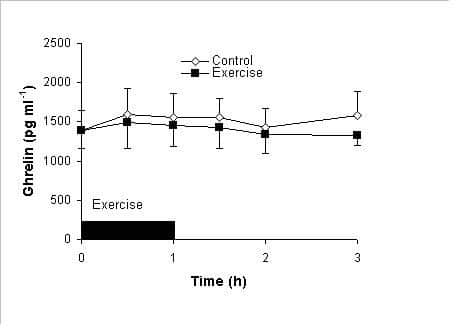Ghrelin is a recently discovered hormone that is secreted by the stomach (Kojima et al. 1999). Ghrelin concentrations rise just before meals and decrease rapidly after meals suggesting that ghrelin is involved in the regulation of appetite (Cummings et al. 2002). This is supported by the fact that infusion of ghrelin leads to a short-term increase in hunger in humans (Wren et al. 2001). Moreover, ghrelin concentrations are elevated throughout the day following diet-induced weight loss indicating an attempt by the body to regain lost weight (Cummings et al. 2002). Little is known regarding the effects of exercise on plasma ghrelin. We hypothesised that an intense bout of exercise would lead to a short-term suppression of appetite, as has been shown previously (Katch et al. 1979), and that this effect would be mediated by suppressed concentrations of plasma ghrelin. Eighteen volunteers (9 men and 9 women) participated in this study which was approved by Loughborough University’s Ethical Advisory Committee. The age, body mass index and maximal oxygen uptake (VO2max) of the participants (mean ± S.E.) were: 24.8 ± 0.9 y, 22.9 ± 0.6 kg m-2 and 57.7 ± 2.2 ml kg-1 min-1. Participants completed two, 3-h trials (exercise and control) on separate days in a randomised balanced design. The exercise trial involved a 1-h treadmill run at 75% of VO2max followed by 2 h of rest. The control trial involved 3 h of rest. Both trials were completed in the morning following an overnight fast. No food was consumed during the trials. Venous blood samples were drawn via a cannula at 0, 0.5, 1, 1.5, 2 and 3 h. Plasma from these samples was frozen at -80°C. Total ghrelin concentration was determined from plasma samples using an enzyme immunoassay (Phoenix Pharmaceuticals). Appetite was assessed following each blood sample using a 15-point ‘hunger scale’. Data were analysed via two-factor (time × trial) repeated measures ANOVAs using SPSS version 11.0 for Windows. Significance was set at P<0.05. Hunger scores were significantly lower in the exercise trial compared to the control trial (mean of six values: 11 ± 1 versus 14 ± 1 respectively). However, venous plasma ghrelin concentrations did not differ significantly between trials or over time (see Figure 1). These findings indicate that an acute bout of intense treadmill running suppresses appetite but this effect does not appear to be mediated by plasma ghrelin concentrations.
University of Nottingham (2004) J Physiol 558P, C9
Communications: No effect of treadmill running on human plasma ghrelin concentrations
Burns,Stephen Francis; Broom,D R; Mundy,C ; Miyashita,M ; Stensel,D J;
1. School of Sport & Exercise Sciences , Loughborough University, Leics, United Kingdom.
View other abstracts by:
Figure 1
Where applicable, experiments conform with Society ethical requirements.

